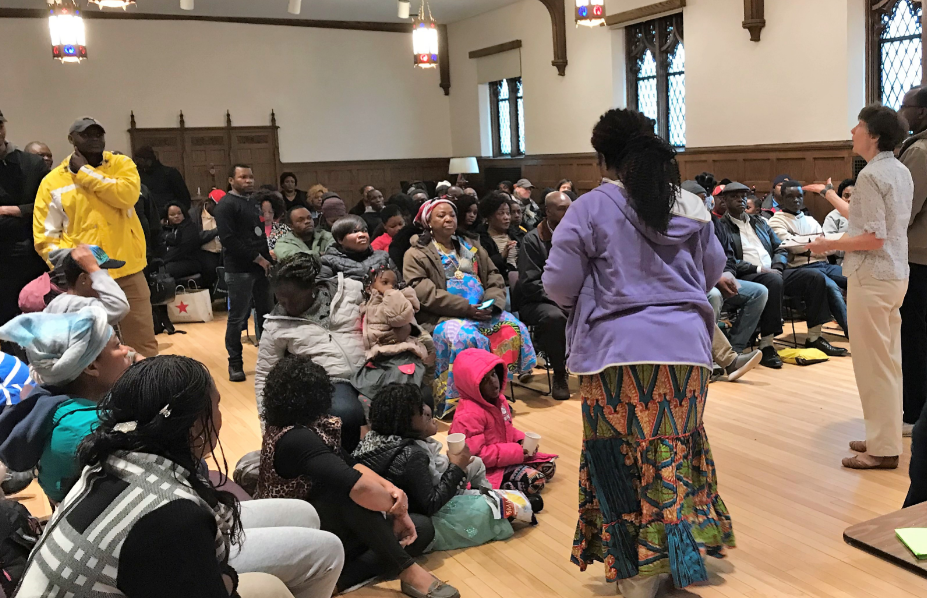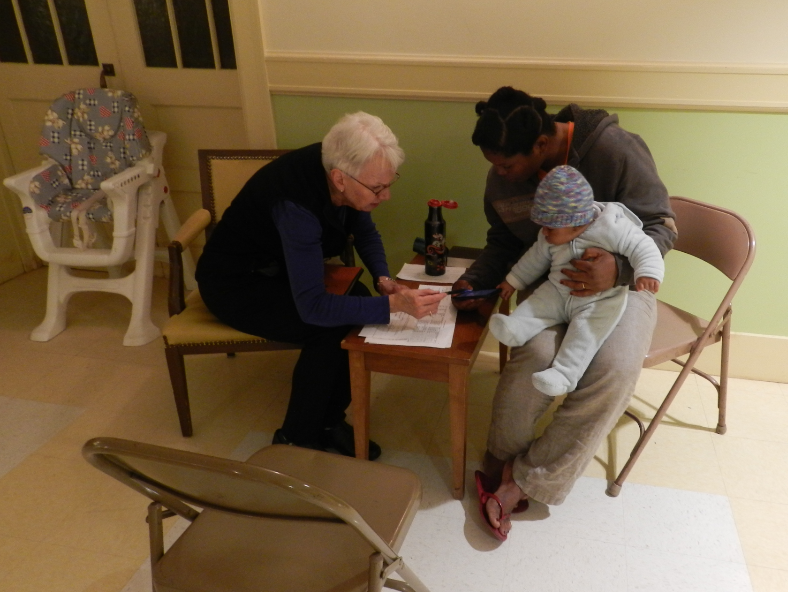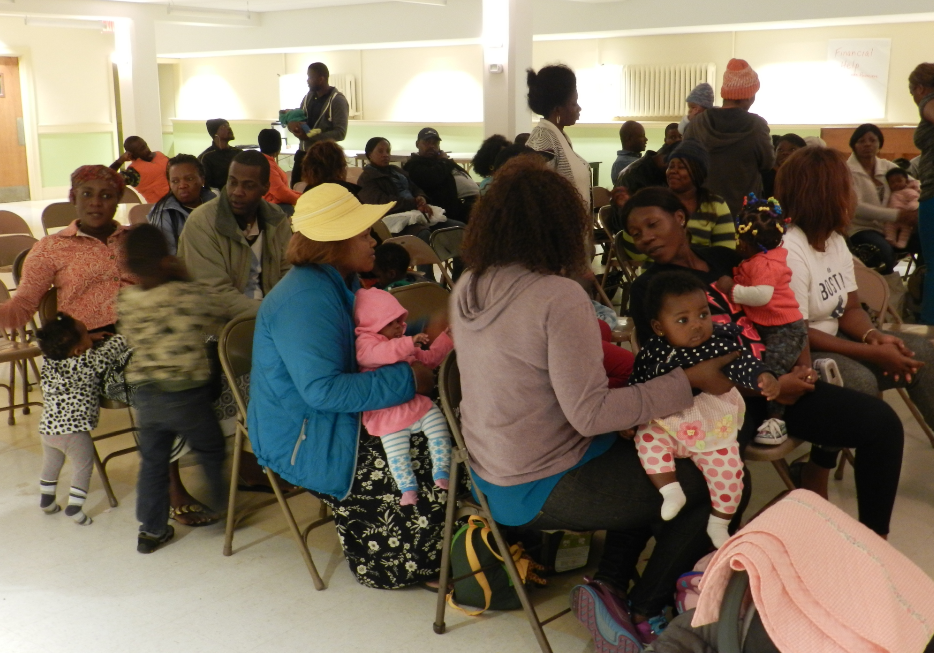UCC assists Maine congregation serving asylum seekers from around the world
 A congregation in Portland, Maine, which serves asylum-seekers from around the world, has been sent a grant from the United Church of Christ to help further its ministry.
A congregation in Portland, Maine, which serves asylum-seekers from around the world, has been sent a grant from the United Church of Christ to help further its ministry.
Williston-Immanuel United Church (WIUC), a 2011 merger of the Williston-West United Church of Christ and the Immanuel Baptist Church, offers food and financial assistance three Thursday mornings a month to an ever growing number of asylum seekers who have found their way to Maine to start a better life.
Alison Barker coordinates WIUC’s Community Assistance program.
“This church seems to a destination for many because we have been able to offer limited financial aid. I consider it humanitarian aid,” she said. “We recognize that many of our ‘Thursday morning guests’ fled for their lives, responding to traumas in their homelands, hoping to land in a safe place. There is no denying the importance of food and shelter. However, these people cannot meaningfully rebuild their lives in this foreign land without having phone access and bus transportation. We offer empowerment and dignity as these new Mainers seek to become established, contributing members of our community. We are grateful for the support we receive so that we can offer compassionate care that says ‘We are the church.'”
Through the WIUC’s Community Assistance (CA) program, thousands of individuals have received food, diapers, phone cards and bus passes since the ministry began in 2013. It is funded by church members and other than Barker, who is paid part-time staff, run by a cadre of seven dedicated volunteers. The congregation — of just more than 150 souls — pledges a financial commitment of $600 month, a hefty sum just supplemented by a $6000 grant from a One Great Hour of Sharing fund. Money that Barker said will go a long way in continuing WIUC’s weekly mission.
“This grant funding falls under the ‘pennies from heaven’ category,” Barker said. “When we learned of the grant, the next Thursday that we were open I invited our guests to express their gratitude for the generosity of the National Church. I ran out of note cards and have yet to get them all translated from French, Portuguese and Lingala, but will pass them along once I do. However, of those that I could read, this was a representative sentiment that I would ask you to share with the larger church: ‘We are so happy by your help. Let God bless u so much because you’re helping a lot of people. Thank you. God bless u!’ There has been no end to the blessings that have come through this ministry for all involved. It has been an absolute privilege to be a part of it.”
 It’s also a ministry that is experiencing exponential growth. In March 2014, WIUC’s CA program helped 41 individuals and families. In March 2017, 109 individuals and families were assisted; aid that also impacted 200 children. In the first five months of 2018, the ministry had provided assistance to 267 households, representing 806 individuals of which almost 400 are children.
It’s also a ministry that is experiencing exponential growth. In March 2014, WIUC’s CA program helped 41 individuals and families. In March 2017, 109 individuals and families were assisted; aid that also impacted 200 children. In the first five months of 2018, the ministry had provided assistance to 267 households, representing 806 individuals of which almost 400 are children.
As the program coordinator, Barker is responsible for financial oversight and making sure that volunteers are ready with stocked shelves, bus passes and phone card vouchers. Food, diapers, personal and household items (e.g. soaps) are received every Sunday and brought forward with the offering. Two volunteers shop for the pantry; another functions as database manager. WIUC uses the database information to limit families to financial assistance once a month to try and stretch its program resources.
Currently three asylum seekers function as translators so program staffers can communicate in English, French, Portuguese, Swahili and Lingala as needed. Morning devotionals are read in English, French and Portuguese.
In the last year, the WIUC Community Assistance program has offered aid to asylum seekers from 29 countries. Staffers use a lottery system to see who can be helped if the number of weekly guests exceeds their means. They often find themselves turning new neighbors away with the assurance that they will help them the next Thursday they are open, since the number of people seeking aid at WIUC has noticeably increased this year.
“When I became coordinator, I was advised to limit financial aid to $25 per request,” Barker said. She often stretches that limit. While Portland has 17 food pantries, Barker indicated that phone access was limited or expensive and bus tickets were rare commodities.
“There are sometimes miles between ‘affordable’ or shelter housing and government or medical offices,” she continued. “Trekking a mile to the grocery store with four children is a hurdle. The more we can do to relieve the stresses of the overwhelming potential of culture shock for this population, the more we are supporting their health and well-being, further reducing the potential for additional trauma.
“Phone access provides these individuals with the capability to function in this century: finding apartments, setting up job interviews, making medical appointments, receiving information regarding governmental requirements. The ability to network with their local asylum seekers is also huge as they help each other navigate this journey that has no map.
“And the bus passes — the only discount we can get is the same one available to the general public: 10 rides for $13.50. That’s only five round trips to last them a month but it is worth gold.
 “In my mind, this grant funding allows us to impart dignity to our guests through the end of this year by empowering them with phone access and bus service, huge steps toward self-determination here,” Barker said. “I made the decision to cross the $25 threshold based on the faith that we would find a way to sustain it. We will continue providing food and diapers as we have, but this financial piece is huge.”
“In my mind, this grant funding allows us to impart dignity to our guests through the end of this year by empowering them with phone access and bus service, huge steps toward self-determination here,” Barker said. “I made the decision to cross the $25 threshold based on the faith that we would find a way to sustain it. We will continue providing food and diapers as we have, but this financial piece is huge.”
“The increase in anti-immigrant actions in the U.S. has expanded the need for their ministry,” said the Rev. Mary Schaller Blaufuss, team leader for Humanitarian and Development Ministries. “I hope this program encourages other congregations working with refugee resettlement or with asylum-seekers to reach out to UCC Refugee Ministries. We are growing our national network of congregations interacting with each other for mutual support, creative brainstorming, and advocacy action.”
“By being able to turn to our own UCC Refugee Ministries for support, we are not only receiving financial support from a known source and kindred spirits who we have supported for years,” Barker said. “UCC Refugee Ministries has also affirmed this church for its commitment to serving those in need, standing shoulder-to-shoulder with us. We are indeed one world under God. It does not matter what your journey. When you are here, you are our neighbor, and we will stand with you.”
Related News
A Prophetic Call for Justice and Peace in Palestine
The executive leaders of the United Church of Christ have issued the following statement...
Read More‘Love is Greater Than Fear’: Regional Youth Events get to the heart of gospel message
United Church of Christ teens attending this summer’s Regional Youth Events (RYE) are...
Read MoreUCC desk calendars available to order now
Prepare for your day, month and year with the United Church of Christ desk calendar —...
Read More


